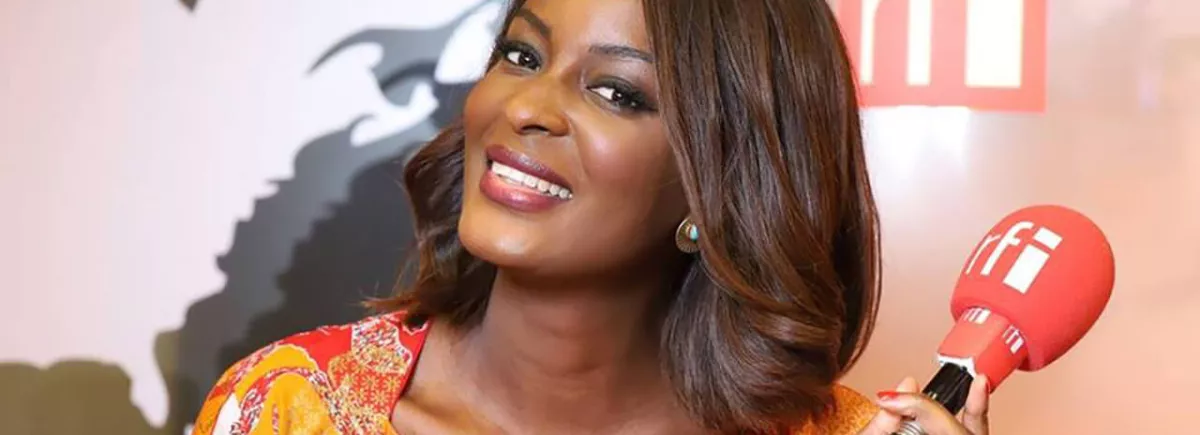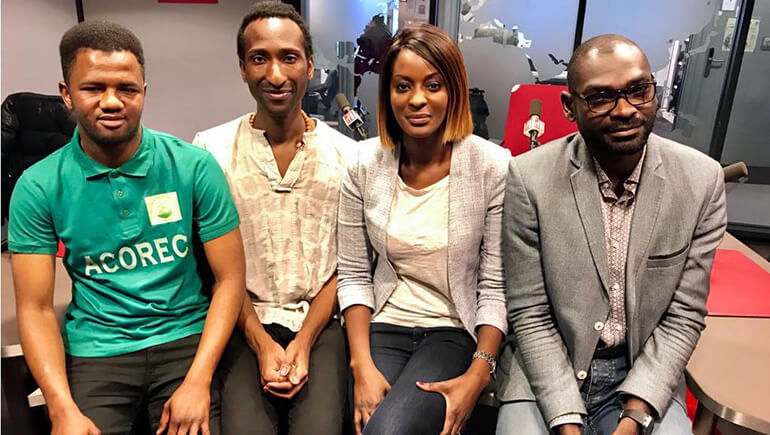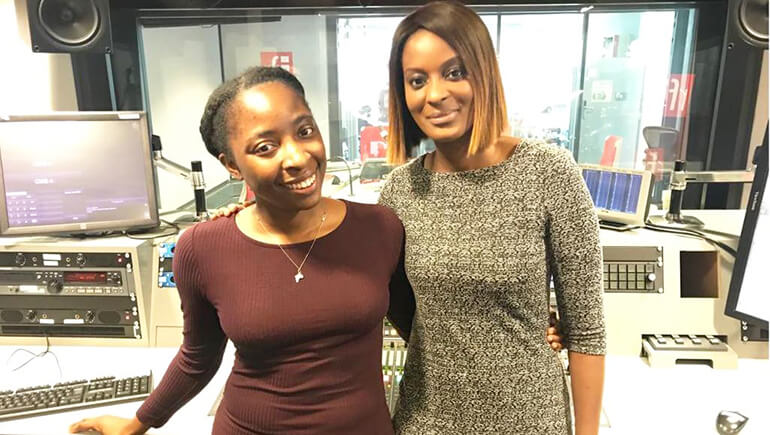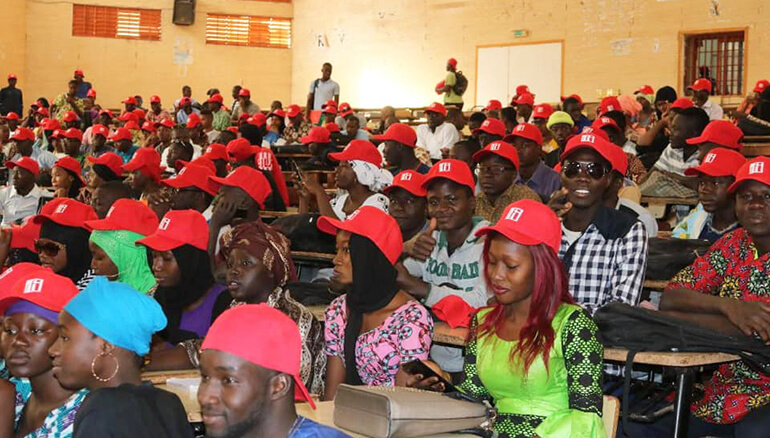
“So, what do you think?” A new programme for the young people of Africa
Related project
MediaSahelWhat do young people in Africa dream of? What are their initiatives in their own countries? These are the questions that the new RFI programme, Alors on dit quoi ? (“So, what do you think?") launched in January 2019, is set on answering.
Every Saturday at 9.10 a.m. UT, 11.10 a.m. Paris time, this French magazine programme tackles themes focused on the everyday life of these young people:
“So, what do you think?” is an interactive programme made by and for all these young people. what are their goals, what difficulties do they face in daily life, and what battles are they fighting? How do they access training, work, culture, and so on?
"Who's better able to talk about African youth if not African youth themselves? […] ."
Beverly Santu, programme journalist
Alors on dit quoi ? veut d'abord inclure les jeunes en proposant des sujets qui les concernent : l'emploi, le changement climatique, la sexualité, le handicap, les migrations en Méditerranée… Son déroulé est articulé autour de la présentation de leurs initiatives dans la thématique choisie.
 Ibrahim Diallo, a member of ACOREC, the “Act Against Climate Change” organisation (ACOREC) ; Dougokolo Konaré, founder and chairman of the West African human rights organisation Observatoire Kisal, ; Diara Ndiaye, the programme presenter, and Aziz, an engineer and environmental risks specialist who graduated from a top engineering school, for the programme Changement climatique : on s'engage ? (“Climate change: are we in?”)
Ibrahim Diallo, a member of ACOREC, the “Act Against Climate Change” organisation (ACOREC) ; Dougokolo Konaré, founder and chairman of the West African human rights organisation Observatoire Kisal, ; Diara Ndiaye, the programme presenter, and Aziz, an engineer and environmental risks specialist who graduated from a top engineering school, for the programme Changement climatique : on s'engage ? (“Climate change: are we in?”) @crédit photo RFI
“So, what do you think?” firstly wants to include young people by raising topics that concern them, such as employment, climate change, sexuality, disability, Mediterranean migration, and so on. The programme lets the story gradually unfold through their initiatives in relation to the chosen theme.
The programme also lets the young people of Africa speak for themselves, as they do not always get the opportunity to express themselves in the media. Guests and correspondents join the journalist Diara Ndiaye as she presents listeners with initiatives, practical tips (such as on writing a c.v., applying for a grant, starting a business, accessing the world of start-ups, etc.) and musical discoveries, or raises their awareness of issues regarding disinformation.
 Diara Ndiaye and Sandy Abena, from the Abenafrica blog on afro culture and history, in the programme Amour de la lecture (“The love of reading”).
Diara Ndiaye and Sandy Abena, from the Abenafrica blog on afro culture and history, in the programme Amour de la lecture (“The love of reading”).@crédit photo RFI
Listeners themselves can express their views live on air through two sections: the rant (protesting about the subject of their choice) and the hashtag (a young person’s message to Africa's youth and their elders, and their visions of a winning formula for Africa). They can also give their opinions on the programme through social media, including WhatsApp, or offer their first-hand accounts and suggest projects by phone. In summary, “So, what do you think?” brings young people and the media closer together by offering them a space to express themselves, with content specifically relevant to them.
"I found your programme by chance last week, via the RFI app. I loved it, it's a programme that teaches us a lot. So, I've listened to every episode!"
One of the programme's listeners.
 Charlotte Kalala, founder of the Congo Na Paris festival; Sally Tiote, creator of Aya markets, and Baila Sarr, President of the Miss Peul committee, on the programme Valoriser sa culture à l’étranger, “Promoting our culture abroad”.
Charlotte Kalala, founder of the Congo Na Paris festival; Sally Tiote, creator of Aya markets, and Baila Sarr, President of the Miss Peul committee, on the programme Valoriser sa culture à l’étranger, “Promoting our culture abroad”.@crédit photo RFI
We are ambassadors for our culture. "And there’s no-one better than ourselves, we the people of Africa, to convey and promote our culture."Charlotte Kalala, founder of the Congo Na Paris festival.
The programme is also going out to meet its audience to get closer to the continent's youth. Four to five times a year, production is moved to the capitals of countries in the Sahel (Bamako, Ouagadougou, Niamey, Nouakchott and N’Djamena). The programme is then recorded in public, followed by a masterclass and discussions between professionals from RFI and the local media.
To date, there have been three such programmes.
- “Mali: those innovative start-ups”, broadcast on 2 March 2019, was recorded at the University of Bamako, in the company of Juan Gomez for the programme "Appels sur l’actualité” (“News Calls”). Diara Ndiaye invited young African entrepreneurs to present African innovation and its strong development potential.
- “Les blogueuses tendance maliennes” (“Mali On-Trend Bloggers”), broadcast on 1st June 2019, was recorded in Bamako. Diara Ndiaye gave four young female bloggers the opportunity to speak, sharing their feelings about the news, their beauty tips, top favourites, etc.
- “La mode, vecteur du développement” (“Fashion, a vector for development”) broadcast on 6 July 2019. For Niger's 12th International Fashion Festival, young female fashion designers presented their view of art and fashion's role in expanding Africa’s influence.
 The on-location recording of two special programmes in Bamako (“So, what do you think?” with Diara Ndiaye and “News Calls” with Juan Gomez) in February 2019. Recording followed by the 19th Bamako Forum, this year on the theme of immigration.
The on-location recording of two special programmes in Bamako (“So, what do you think?” with Diara Ndiaye and “News Calls” with Juan Gomez) in February 2019. Recording followed by the 19th Bamako Forum, this year on the theme of immigration.@crédit photo RFI
The “So, what do you think?” magazine programme is produced for radio as a collaboration between CFI and RFI, as part of the MediaSahelproject, and since April 2019 has included Mandinka and Peul-language versions.
Follow news of the programme and listen to its podcasts: http://www.rfi.fr/emission/alors-on-dit or join the Facebook community.


